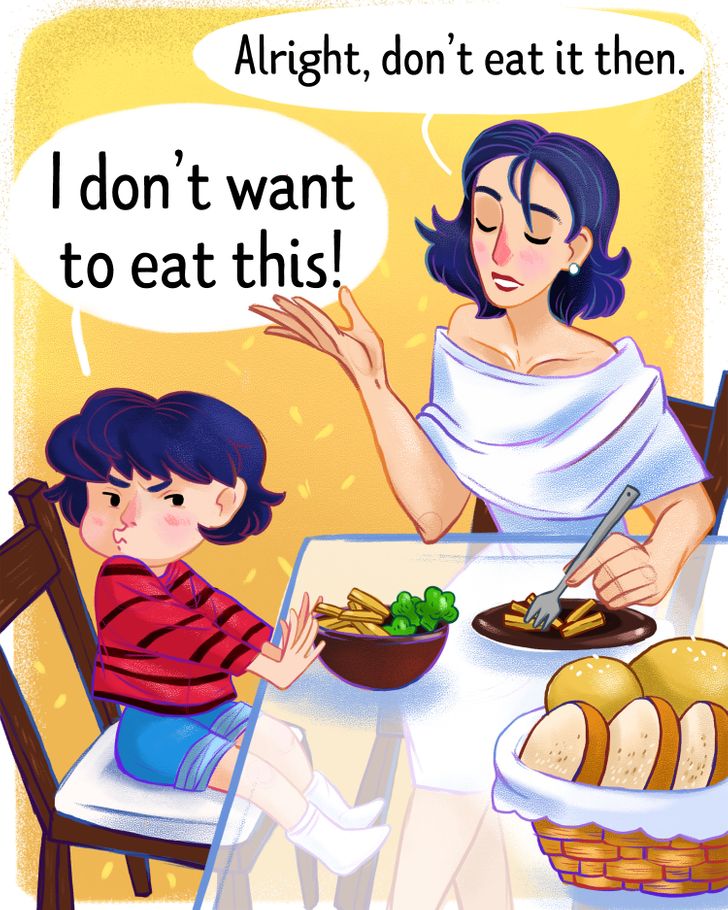No
7 Tips From a Lazy Psychologist Mom That Parents Around the World Are Thankful For
Anna Bykova is a lazy mom. And she isn’t ashamed to admit that. Moreover, the psychologist and the author of several best-selling books is even proud of this “title” as she believes that it gives her children an opportunity to become more independent. However, by laziness, Anna doesn’t mean lying on the sofa all day long, but a desire to not do everything herself. For example, sometimes it’s better to be “lazy” and let a 7-year-old do the dishes to improve their fine motor skills. And it’s fine that you’ll have to wipe the floor dry after this and wash the dishes again when the child isn’t looking.
Bright Side supports this unusual parenting technique that’s basically the opposite of being overprotective. And, with the author’s permission, we’d like to share with you some tips that can make the lives of many parents way easier.
Train your child to use the potty
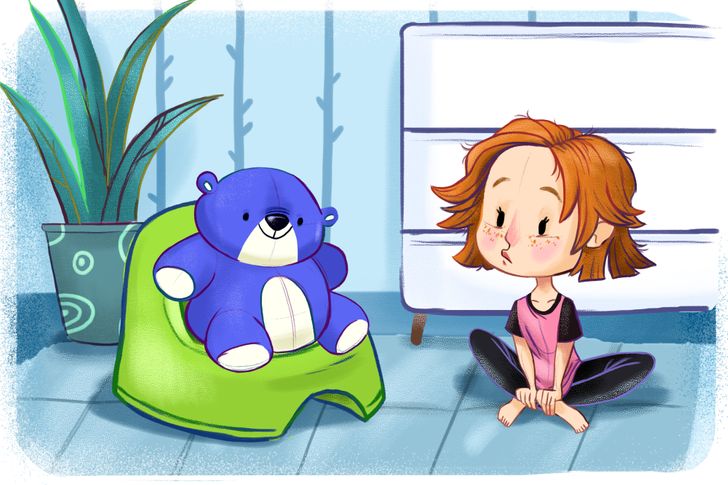
How? It’s a step-by-step process that requires patience.
- The potty should always be in the same place where a child can easily see it. Never force the child to sit on a potty.
- In the beginning of the training, don’t forget to praise your child every time they sit on the potty. The result is irrelevant at this point: it doesn’t matter if they actually left something in the potty or if the child did you a favor and just sat on this weird object with their pants off.
- You can also try to put a teddy bear on the potty and tell fairy tales about how characters enjoy wearing dry pants. And that’s it! The rest is just a matter of time.
From the book An Independent Child or How to Become “A Lazy” Mother by Anna Bykova.
Prevent your child’s temper tantrums
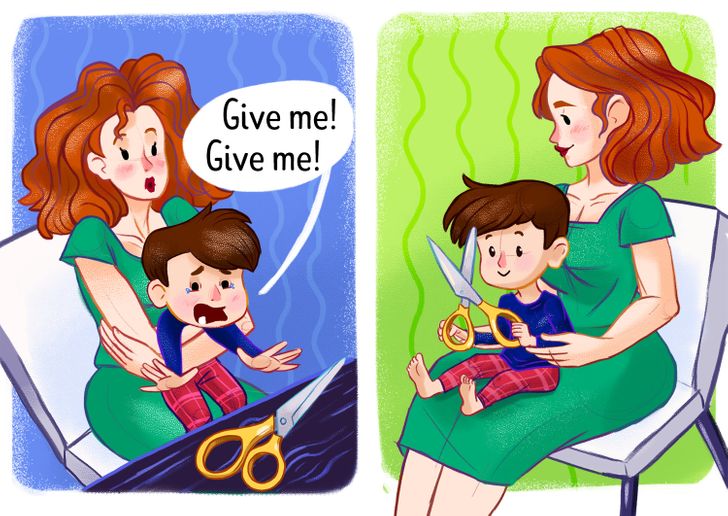
- Hide all the things they can’t touch from the child.
- Show the child a new bright object or promise to do something else even more exciting. I always carry a bottle of bubbles with me, a balloon that I can blow up in the case of an emergency, or small and cheap toys.
- Scissors are a dangerous toy for a kid and if they really want to touch them, it’s fine to let them do it — but only if mom controls the process. Having too many taboos irritates the child and limits their development.
- Try the approach, “Of course, we’ll do it but we’ll have to wait until later.” or “Yes, but...” It works like this: “Of course, we’ll play, but let’s get some sleep first.”
- If you need to stop a game to feed your child, suggest feeding a toy first. For example, if you want to make your young “builder” stop building and have lunch, don’t say “Leave your building set and let’s go eat.” Just announce that the construction team is having a lunch break.
- Suggest an alternative and the child will behave the way you want. For example, you could ask: “Will you pick up your toy soldiers or cars first?” Unfortunately, this technique doesn’t work for long. After a certain age, the child can and probably will refuse to perform both actions.
Manage your child’s temper tantrums
If you’ve failed to prevent a tantrum, you can do the following:
- Shift your child’s attention to something else.
- Come up with a calming routine. As a rule, most families develop their own calming routine over time. It can be the same rhyme, fairytale, or game. For example, mom can gently blow on the child’s eyes to dry their tears. Or you can give the child some “magic” water that will calm them down.
- Just ignore this behavior. If you’ve already tried other methods and there are no health risks involved (like an epileptic or asthmatic seizure), you can leave the child alone to cry for a little while or just ignore their screaming. Don’t scold your child or lock them up alone in a room, just share your feelings: “I think you just want to cry right now... When you’re done, we’ll [offer to do something fun].”
Feed a picky eater
Food is a basic human need. Imagine that you’ve “forgotten” to feed a newborn. They’ll let you know about how hungry they are with a loud scream and won’t calm down until you feed them. The child knows best when and how much they should eat.
- When you offer the child varied and colorful food, remember the psychology behind it: the most important thing is to not try to persuade them. Let your child become really hungry. The appetite is always better when it’s associated with positive emotions.
- If you let the child take part in the cooking process, give them an opportunity to try different ingredients and pick products at the supermarket, you’ll never face problems with poor eating again.
- And when you want to give your child more food than they actually need, just take some time and think: “Why do I do that? Is it about the stereotypes from the past? Do I believe that we should never have anything left on the plate? Or am I afraid that the child will still be hungry?” The child isn’t an enemy to themselves and they have a strong connection with their bodies. They’ll eat when they’re hungry. Feeding the child by force isn’t the best way to express parental love.
Stimulate your child’s appetite
- If the child isn’t eating anything at meals, don’t let them have snacks between them.
- Try to avoid products with taste boosters and artificial flavors. When the child gets used to them, healthy food will taste stale.
- Give the child fewer sweets.
- Walk more often and make your child more active. This will have a positive influence on the appetite.
Put your child to bed

Your child may have difficulties with falling asleep because they’ve developed the habit of falling asleep while crying, they perceive sleep as a punishment, or they feel an exaggerated importance when it comes to falling asleep on time that was created by their parents.
I’d like to share with you my own observations and methods I used when I worked in a kindergarten class.
- Body-oriented therapy. I sat on the chair next to the child’s bed. I put one hand on their thigh, gently fixing their legs, and the other one on their shoulder. Then I made very gentle swaying movements. This technique allows them to achieve muscle relaxation, as well as calm down the nervous system.
- Joint breathing. With my hands on the child’s body, I tried to mimic their breathing. I gradually started to breath deeper. Then I swung the child a bit. Thanks to slow deep breathing and flicking motions, the children fell asleep quickly.
- Dull reading. When I read a book, I inserted phrases about relaxation and falling asleep in the text: “And then the bear said... I’ll sit on the stump... Eat my pie... Lie on the grass... Take a nap...” It is essential to read slowly on exhalation, with pauses to make your breath smooth and gradually slow down the pace of your speech. If you do this right, you’ll notice a slowdown in the breathing of your listeners.
Get your child used to sleeping alone

- Come up with a symbol of a calm sleep. It can be a toy that the child will hug when falling asleep. And it’ll be easy for them to fall asleep not only in their own bed, but in any place.
- Move to a new bed together. If the child has been sleeping with their parents, the mom can sleep with them in their new bed in the beginning. This way the child will get used to the new bed together with their mother, and then will eventually be ready to fall asleep alone.
- Increase motivation. If personal motivation isn’t strong enough, it’s essential to find new sources. You can pick out new bed sheets or some other accessories together with your child: glow in the dark stars for the ceiling, a cute nightlight, and a dream catcher are perfect options.
Every mother has her own parenting secrets. Share in the comments how you trained your child to use the potty. Or maybe you have your own tips on how to put your child to bed or feed a picky eater?
Comments
My friend told me a story, once her daughter didn't want to eat dinner, and complained the whole time that she only wants to eat sweets. Other things are not tasty. Her mom was tired from her daughter's never ending complains, and she agreed. She let her eat sweets the whole next day. At first her daughter enjoyed, but at the end of a day she asked for normal food. After this she never complained about it anymore.
This is a little bit cruel, but really smart at the same time! Sometimes you need to be tough (not VIOLENT), so the child can understand what is good and what is bad :)
Lazy advice is always the best advice.
Those parents who take way too much care of their child can end up having a spoiled one who can't make a step without mom and dad.
I wouldn't call them lazy, I would call this advice wise ?
My mom always let me try new things, so I could find what I like. Thanks to her I had many hobbies, and know I know a lot about different things, I have a job that I like and literally just enjoy :)
Many of these tricks are mindsets for training with adults, horses, and dogs surprisingly.
Growing up, my mother always would tell me the consequences of what I was about to do. She would warn me and tell her own story of what happened when she did it as I got older. When I was a child, she would say "If you don't go to bed on time, you'll get in trouble and have your books taken away. Then you won't be able to read the next chapter and find out what happens to [Polly]". She helped me think through all the results...as a teen, she would say, I can't stop you, but when I had sex young, I felt this way, had this happen to my body, etc. Got pregnant, etc. That kept me from being able to do -XYZ-.
I love her for that because she took the time to help me learn and understand. I was naturally rebellious but grew up as a model child comparatively. When I started nannying, I used the same methods to include a calm demeanor, the children's parents thanked me profusely for years with how quickly the kids shaped up and acted better.
Neverthe case eat all or starve
Related Reads
New Study Reveals How Marriage Could Surprisingly Affect Dementia Risk

10 Parenting Mistakes We Should Avoid

9 Unexpected Things That Show a Marriage Won’t Last Long

15+ Times When People Bought Junk at a Garage Sale, but Actually Ended Up With a Treasure Instead

15 Real-Life Stories With Hard-to-Believe Plot Twists

Zac Efron’s Appearance a Few Days Ago Leaves Fans Shocked and Worried

“She Is So Skinny”, Princess Catherine Deemed Unrecognizable in New Unseen Pic

10+ People Revealed the Moment They Knew Their Partner Was “The One”

A Man Shows Off His Plastic Surgery Results, and It Shocks People

12 People Who Definitely Didn’t Regret Quitting Their Job
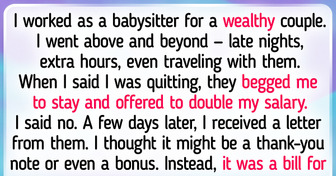
I Forbade My MIL From Visiting My Kids After She Crossed the Line
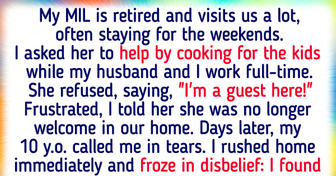
16 Disturbing Wedding Stories That Quickly Ended the Relationships


